Key takeaways:
- Standardized testing often fails to reflect the true abilities of students, especially those with learning differences like dyslexia, leading to feelings of inadequacy.
- The pressure and rigidity of standardized tests can negatively impact students’ emotional well-being and narrow the scope of their learning experiences.
- Alternative assessment methods, such as project-based or oral assessments, could better showcase students’ skills and accommodate diverse learning styles.
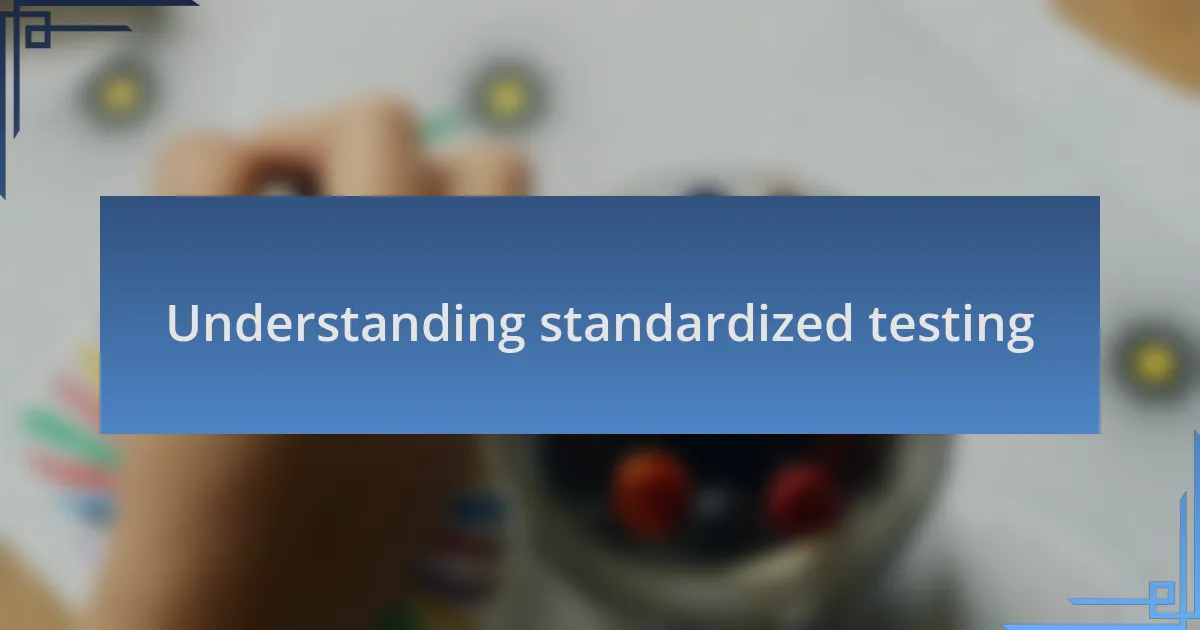
Understanding standardized testing
Standardized testing, at its core, is designed to measure student performance against a uniform set of criteria. It’s fascinating, yet a bit unsettling, to think about how a single test can carry so much weight in a student’s academic journey. I remember back in school feeling the pressure as if my entire future hinged on a few hours of testing.
As I navigated through various educational paths, I began to question: are these tests truly reflective of a student’s abilities? For many, especially those with learning differences like dyslexia, these assessments often fail to capture their full potential. I’ve witnessed students who are bright and creative struggle under the rigid confines of a standardized test, feeling defeated when their scores don’t showcase their true skills.
Moreover, the implications of standardized testing extend beyond individual performance; they shape educational policies and funding decisions. I’ve seen the frustration of educators trying to teach to a test rather than fostering a love for learning. Isn’t it worth considering how we can create assessment methods that are more inclusive and fair? Engaging with this question might lead us to a more supportive educational environment.
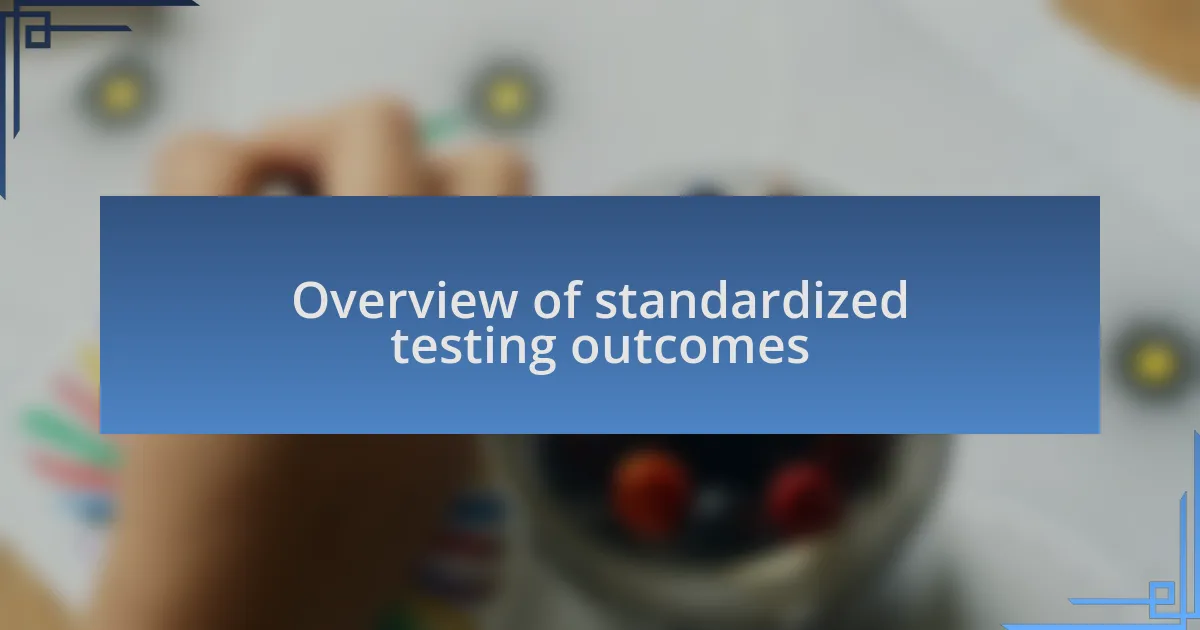
Overview of standardized testing outcomes
Standardized testing outcomes often present a stark picture of student performance. I recall a friend who was incredibly bright yet faced challenges due to her dyslexia. Despite her creativity and critical thinking skills, her test scores fell short of reflecting her true abilities, leading to feelings of inadequacy. How can we expect these tests to encapsulate the diverse talents within our classrooms?
The reality is that these tests can reinforce existing disparities. Students with learning differences, like dyslexia, often find themselves at a disadvantage, struggling with timed tasks designed for traditional learners. I’ve seen firsthand how such outcomes can impact a student’s self-esteem, making them doubt their capabilities. Should we not strive for a system that celebrates individual strengths rather than diminish them?
Another troubling aspect involves the broader implications of these outcomes. School funding and resources are frequently tied to test scores, leaving schools serving students with diverse needs at a disadvantage. This makes me question how we can create a more equitable education system that offers every student the chance to thrive. Why not explore alternatives that appreciate varied learning styles and abilities?
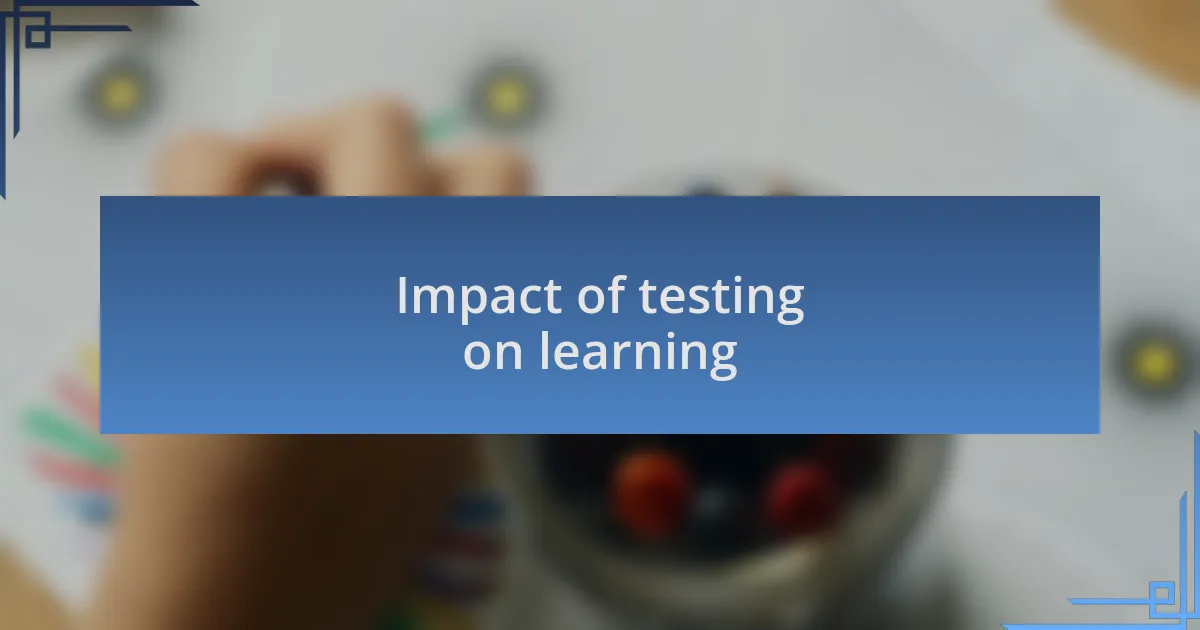
Impact of testing on learning
Standardized testing can profoundly impact learning, shaping not just academic outcomes but also students’ emotional well-being. I once tutored a young boy with dyslexia who was brilliant at storytelling but faced immense frustration during reading assessments. Each test felt like a brick wall to him; rather than showcasing his imagination, it underscored his struggles. Do we truly want assessments that stifle creativity and curiosity?
In my experience, the timing and format of these tests can alienate students with learning differences. I remember sitting in on a session where the ticking clock caused palpable anxiety among students. For many, this pressure undermined their ability to demonstrate what they genuinely knew, sparking a fear of failure. Shouldn’t we be fostering an environment where students can express their knowledge without the added stress of the clock?
Moreover, the reliance on these rigid metrics can inadvertently narrow the curriculum. When I worked with teachers who felt compelled to “teach to the test,” I noticed a shift away from engaging, hands-on learning. The vibrant discussions and explorations were replaced by repetitive practice drills aimed solely at improving scores. Is this really the best approach for nurturing a love of learning? We ought to be recognizing and embracing the unique learning journeys of each student rather than conforming them to a one-size-fits-all model.
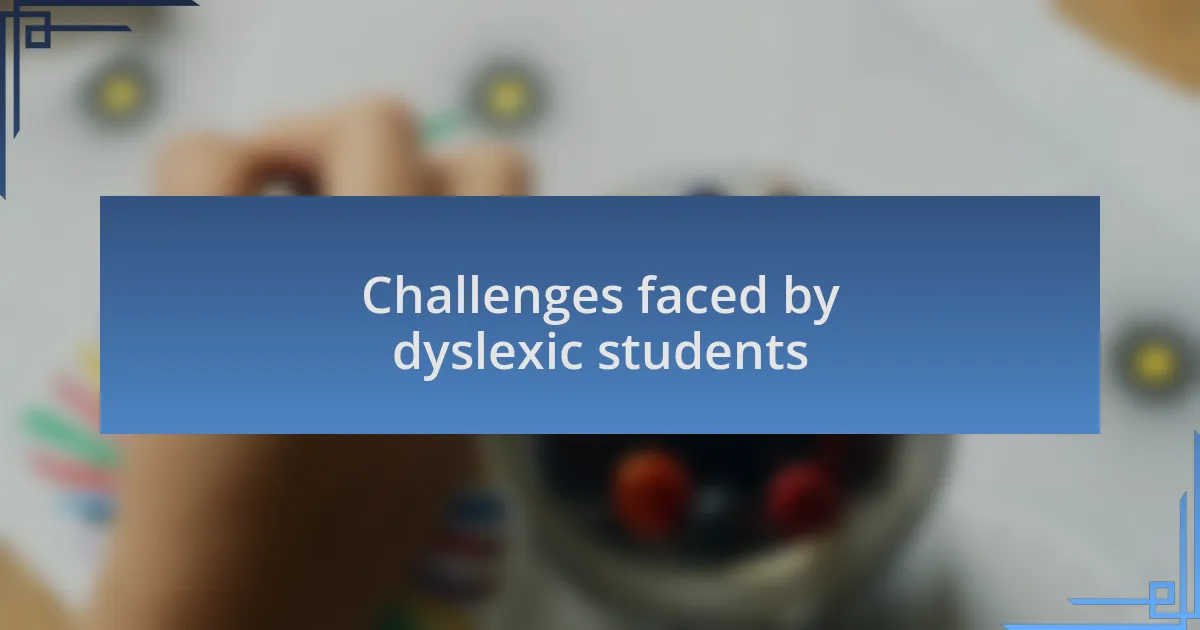
Challenges faced by dyslexic students
Dyslexic students often grapple with processing written information, which can turn even straightforward tasks into significant hurdles. I’ve seen firsthand how a simple reading assignment can spiral into overwhelming anxiety for these learners, making them feel as if they’re constantly racing against a clock that isn’t even ticking yet. How can we expect them to perform their best under such pressure?
The emotional toll of standardized testing is also something I don’t take lightly. One of my former students, who had a brilliant grasp of concepts but struggled with reading, would break down in tears at test time. His struggles often felt brushed aside, leading him to believe that he was less intelligent than his peers. Shouldn’t assessments reflect understanding rather than measure anxiety?
Moreover, the rigid structure of these tests often fails to accommodate diverse learning styles. I’ve observed that many dyslexic students are kinesthetic learners who thrive on interaction and practical engagement. When they are confined to multiple-choice formats, their true potential remains hidden. Aren’t we doing a disservice if we ignore the ways these students learn best?
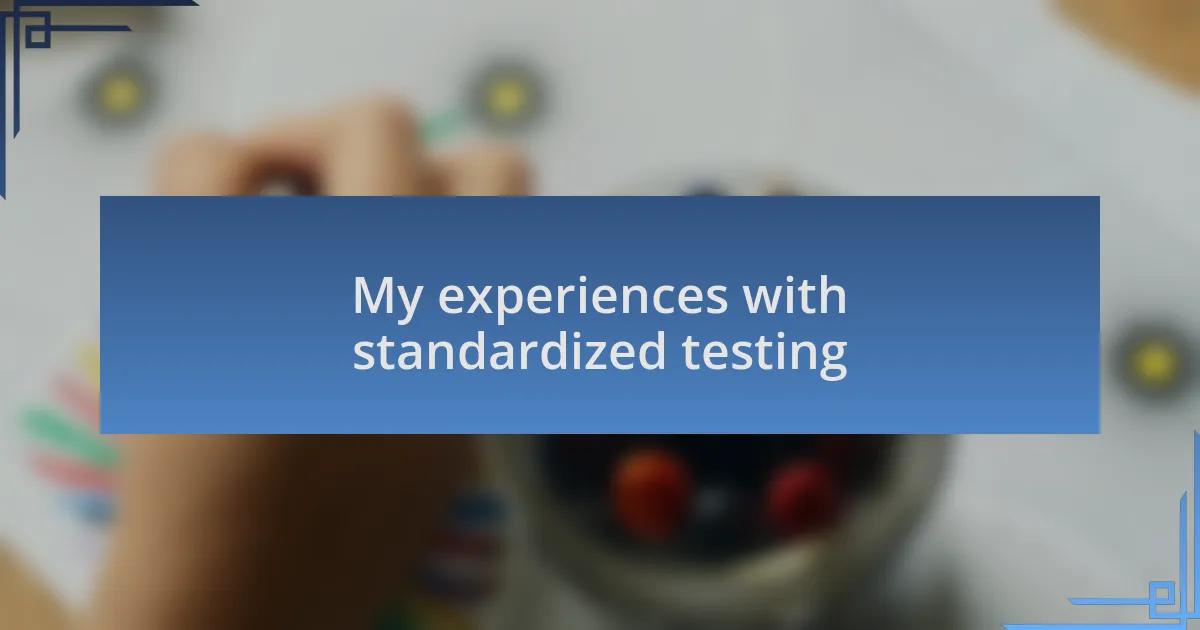
My experiences with standardized testing
Standardized testing has always seemed like a double-edged sword to me. I recall a time when I was involved in preparing a group of dyslexic students for state assessments. Despite their deep knowledge of the subjects, the anxiety that came with the test inevitably clouded their confidence, making it difficult for them to shine when it truly mattered. How fair is it to judge understanding based on a test format that doesn’t cater to all learning styles?
I vividly remember one student who had a remarkable ability to articulate his thoughts verbally but stumbled in writing tasks, especially under timed conditions. During the testing period, I noticed his usual enthusiasm fade as he tried to decipher the questions. It broke my heart seeing him struggle with words that, outside the testing room, he could explain effortlessly. Why should a test dictate a student’s self-worth?
Another significant observation from my experiences is how the time pressure amplifies the challenges these students face. I had a student who needed just a bit more time to process questions and format his responses. Unfortunately, the clock seemed to overshadow his knowledge. Isn’t it time we reconsider how we assess learners, focusing on their strengths rather than their struggles?
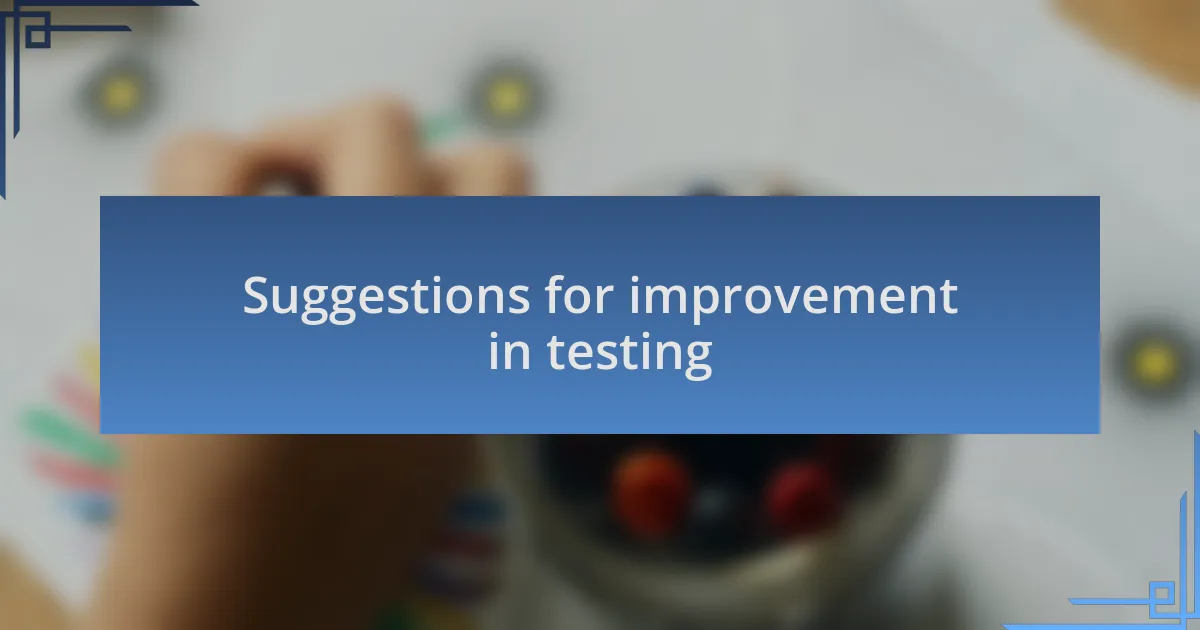
Suggestions for improvement in testing
One suggestion for improving standardized testing is to incorporate alternative assessment methods. For instance, I’ve seen firsthand how project-based assessments can bring out the true potential of dyslexic students. When a student isn’t confined to a rigid test format, they often express their understanding more creatively and effectively. Isn’t it time we let them showcase what they truly know?
Another improvement could be allowing for extended time or providing a separate, quiet space for those who need it. I remember coaching a student who excelled in a small group setting but struggled with the pressures of a crowded testing environment. When given those accommodations, her performance soared. Why not create more equitable testing conditions that recognize individual needs?
Additionally, integrating more oral assessments could be beneficial. I often find that many students with dyslexia are articulate and can demonstrate their knowledge better through discussion than through writing. One time, after engaging in a one-on-one dialogue with a student, I was amazed at the depth of understanding they had that simply didn’t translate onto paper. Shouldn’t we prioritize methods that allow every student to shine in their own unique way?